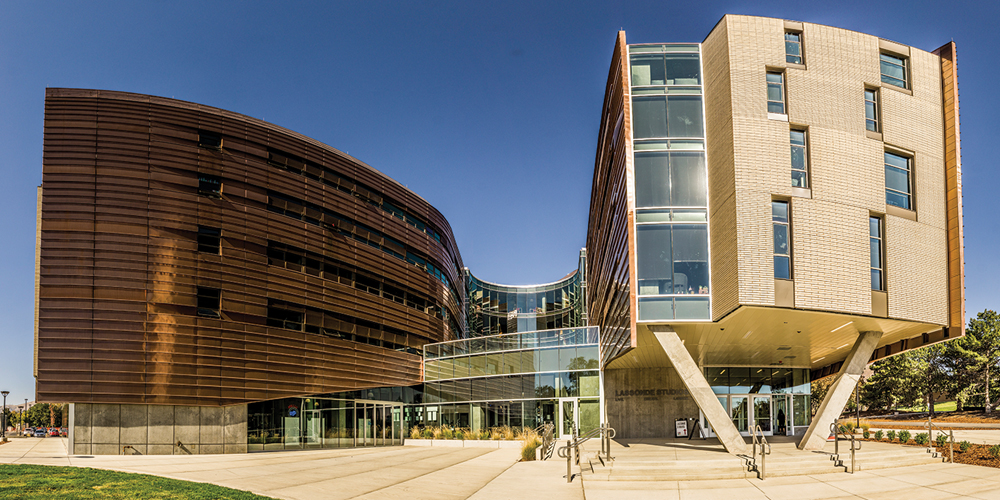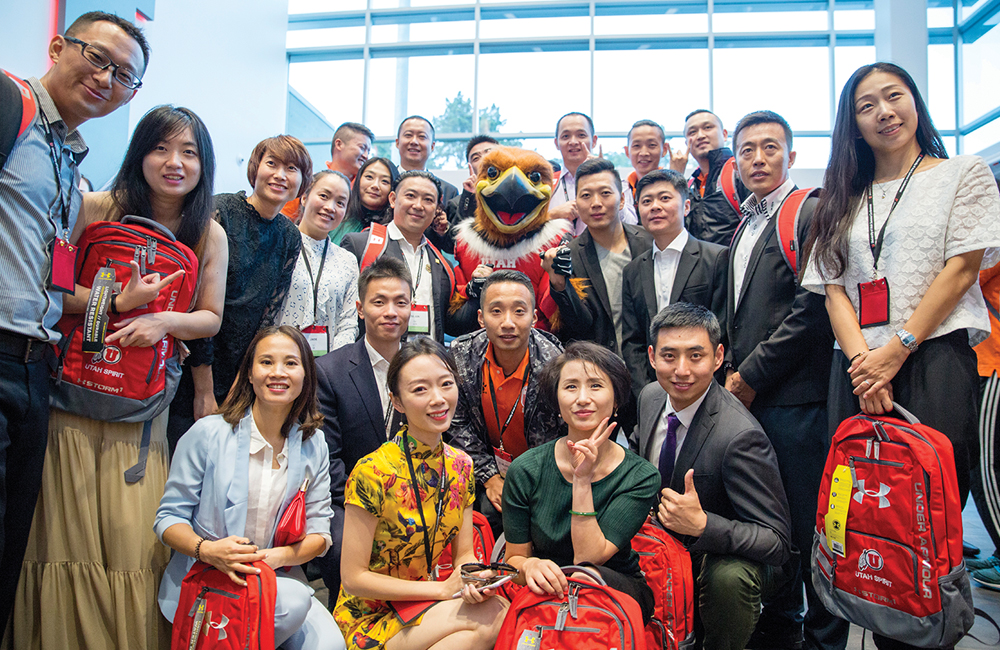Lassonde Studios Opens Its Doors
After much anticipation and excitement, the new Lassonde Studios opened in August to welcome its first cohort of 400 student residents. The $45 million facility is a place where students from any major or background can live, create new products, and launch companies.
A nationally ranked division of the David Eccles School of Business, the Lassonde Institute announced the building project in April 2014 and broke ground in October of the same year. During construction, Lassonde Studios received worldwide attention, with features in publications such as the New York Times, Fast Company, and Bloomberg.
Lassonde Studios is about 160,000 square feet on five floors. The first floor is a 20,000-square-foot innovation space, workshop, and cafe open to all students on campus. That floor has many spaces and tools, including workbenches, group work areas, 3-D printers, a laser cutter, power tools, and more. The first floor is similar to a student union for those interested in entrepreneurship and innovation. Above are four floors of student housing.
More than 1,300 students applied to live at Lassonde Studios this year. Those selected are often referred to as the “Lassonde 400.” This year’s residents have a variety of academic interests—the most popular include business, engineering, computer science, video games, and film—and they are 37 percent female, 63 percent male. Half are freshmen, and the rest span across every class, including graduate students. “We think we have assembled one of the best groups of entrepreneurs anywhere,” says Troy D’Ambrosio BA’82, executive director of the Lassonde Institute. “We can’t wait to see what the Lassonde 400 accomplishes this year and in the future.”
Lassonde Studios is made possible through the vision and generosity of Pierre Lassonde MBA’73, a world-renowned gold investor, founder of the Franco-Nevada Corporation, and U alumnus who has donated $25 million to support the Lassonde Studios and related programs “We wanted to create a community of entrepreneurs unlike anything anywhere else,” says Lassonde. “The Lassonde Studios will help make this possible by providing all the space and tools students need to do amazing things. The University of Utah is now the place to be for young entrepreneurs.”
Learn more about the Lassonde Studios at lassonde.utah.edu/studios.
Learn more about the Lassonde Institute at lassonde.utah.edu.
The FanUp Pledge
The U invites its loyal sports supporters far and wide to “FanUp” and stake our claim as one of the best fan bases in the nation. Last spring, President David Pershing formed a committee of students, trustees, athletes, fans, alums, and university employees to create a campaign to promote the kind of sportsmanship that reflects the values of the University of Utah. As a result, the university launched the FanUp campaign asking fans everywhere to take the following pledge.
I WILL:
1. Love our Utes and welcome visiting teams and their fans
2. Promote a family-friendly experience
3. Enjoy the game responsibly
4. Cheer loud and be Ute Proud!
The campaign also has designated a text number to report poor fan behavior during a sporting event. Text “FANUP <issue and location>” to 69050.
UMOJI Mania
 Good news for those who are tired of using the high-five emoji as a substitute for Flash-the-U. The U has released an official emoji keyboard called UMOJI —with a “Lite” version for free and a paid version with more choices for $1.99. The icons are available in the App Store and Google Play Store, and can be found by searching “Utah Umoji.”
Good news for those who are tired of using the high-five emoji as a substitute for Flash-the-U. The U has released an official emoji keyboard called UMOJI —with a “Lite” version for free and a paid version with more choices for $1.99. The icons are available in the App Store and Google Play Store, and can be found by searching “Utah Umoji.”
Click here for the UMOJIS page.
Manufacturing a Brighter Future
One of the hot-button issues these days is outsourcing overseas. The big question is how to keep jobs in America. To help convince businesses they can perform better in their own backyard, two U mechanical engineering professors, Bruce Gale PhD’00, and Bart Raeymaekers (pictured L to R), established a center to show local manufacturing companies how they can spur innovation and utilize the latest technology.
The new Manufacturing Extension Partnership (MEP) Center will deliver services for small and medium-sized manufacturing companies by providing expertise in advanced technology, innovation, worker education, operational excellence, and investment strategies. “The goal of the program is to provide these services so businesses can remain competitive against cheap overseas labor and to keep those manufacturing jobs here,” explains Raeymaekers.
In partnership with other entities and organizations throughout the state, the center will help local businesses use data to identify products and growing markets and provide prototyping resources. The MEP Center receives funding from the U.S. commerce department’s National Institute of Standards and Technology and the Utah Governor’s Office of Economic Development. All told, the center will receive $16 million in funding over the next five years.
The center is under the U’s College of Engineering and engages more than a dozen permanent employees, consultants, and industry professionals. Headquartered on campus, it will also have satellite offices in Cache and Utah counties as well as consultants in eastern Utah and Cedar City.
Chinese Coaches Train on Campus
The U has had a few extra coaches hanging around campus this fall—89, to be exact, and all from China. The high school coaches are here as part of the first-ever China coaches training program. For three months, they are training with U Athletics staff to learn coaching techniques for sports including men and women’s basketball, track and field, swimming, and cheerleading.
Part of the Pac-12 Globalization Initiative and funded by the Chinese Scholarship Council, the program specifically focuses on coaching strategy, game preparation, film review, assistant coach development, and practice structure. In addition, the curriculum includes off-the-field items such as sports psychology, strength training, nutrition, public relations, and marketing.
The program is coordinated through the U’s Office for Global Engagement. “A critical part of the U’s mission is to explore and better understand the interconnectivity between people and places around the world, and then apply that learning here at home,” says Michael Hardman BS’71 MEd’73 PhD’75, chief global officer for the U. “This very unique program brings some of China’s best high school coaches to our campus, providing us the opportunity to share our expertise as well as learn from and about Chinese culture.”
Uni Introduces Suicide Prevention App
 Utah children and teens in crisis have a new way to reach out for help. An app developed by the U’s Neuropsychiatric Institute (UNI) aims to reduce the suicide rate among young people in Utah. The SafeUT app is a statewide service funded by the Utah Legislature that provides real-time crisis intervention to youth through texting and a tip program.
Utah children and teens in crisis have a new way to reach out for help. An app developed by the U’s Neuropsychiatric Institute (UNI) aims to reduce the suicide rate among young people in Utah. The SafeUT app is a statewide service funded by the Utah Legislature that provides real-time crisis intervention to youth through texting and a tip program.
Students can use their smartphones to connect directly via chat, text, or a call to licensed clinicians trained in mental health crisis management and suicide prevention. Clinicians are available 24/7 to assist with a wide variety of problems, including emotional crisis, grief, bullying, addiction, abuse, mental health issues, and suicidal behavior.
The SafeUT app is free, anonymous, and confidential. The program has rolled out to more than 160 schools so far and plans to enroll all Utah schools in the program by next summer.
Download the app at the iTunes store, Google Play and elsewhere.
Welcome to the First Cohort of Students from the U’s Asia Campus
In 2014, the University of Utah Asia Campus (UAC) opened its doors in Incheon, South Korea, to students looking for a global and culturally diverse education. This fall, the U welcomed the first group of students from the campus to Salt Lake City to complete their degrees.
Although most undergraduate students will spend three years at the Asia campus before finishing their degrees in Utah, several of these students are on an accelerated path and have already accrued enough credits to enter the U’s main campus as college seniors. The group also includes graduate students in the master of public health program, who are coming to complete the second year of the two-year program.
Fall 2016 enrollment at the UAC has increased to 225 students, and next year, a larger cohort of about 60-70 undergraduate and graduate students are expected to arrive in Salt Lake City. As the UAC increases its degree offerings in the years to come, more than 300 students are anticipated to arrive each year to complete their U degrees.
As one of the founding institutions of Incheon Global Campus, the U currently offers undergraduate degrees in communication, psychology, and social work, and the master of public health. Planning is under way for four new degrees to be offered beginning in spring 2017. Students will soon be able to get an undergraduate degree in film and media arts or urban ecology, a master’s degree in biomedical informatics, or a Global Juris Doctorate.
The global campus also includes Belgium’s Ghent University, George Mason University, and the State University of New York, Stony Brook. All students attending the UAC meet the same admissions and program degree requirements as main campus students, are taught and mentored by qualified U faculty, and receive a University of Utah degree.
The U will accept student applications for the spring semester until Jan. 15, 2017, and admission will be granted on a rolling basis. Main campus students are encouraged to take advantage of a global learning abroad experience at the UAC.
The Asia campus also celebrated the opening of its new building in September. The nine-story, 170,000-square-foot facility is modeled after the iconic J. Willard Marriott Library. The LEED-certified building includes a welcome center, student lounge, 26 lecture halls and classrooms, counseling center, and more than 100 faculty and student support offices.
Utah Entrepreneur Joins Board of Trustees
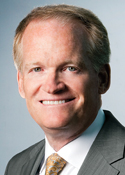 James Lee Sorenson BS’75 has been named a member of the university’s Board of Trustees. A globally prominent entrepreneur, Sorenson has built highly successful enterprises in fields ranging from technology and life sciences to real estate and private equity investment, all of which have added thousands of jobs to Utah’s economy.
James Lee Sorenson BS’75 has been named a member of the university’s Board of Trustees. A globally prominent entrepreneur, Sorenson has built highly successful enterprises in fields ranging from technology and life sciences to real estate and private equity investment, all of which have added thousands of jobs to Utah’s economy.
After launching several successful business ventures while still a U student, Sorenson became a leader in the field of digital video compression and later co-founded Sorenson Capital. In 2013, he provided the U with a $13 million gift to create the James Lee Sorenson Global Impact Investing Center.
“As Utah’s flagship institution of higher learning, this great university has a major impact not only on the city and state I choose to call home, but in the nation and the world,” says Sorenson. “I’m honored to serve on the Board of Trustees for my alma mater.”
Pharmacy College Appoints New Dean
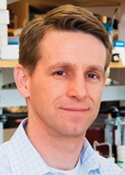 Randall Peterson, a prominent Harvard chemical biologist who pioneered the use of zebrafish to discover new precision drug therapies for cardiovascular and nervous system disorders, has been tapped to serve as dean of the College of Pharmacy. He assumes his role as dean and L.S. Skaggs Presidential Endowed Chair for Pharmacy effective Jan. 1, 2017.
Randall Peterson, a prominent Harvard chemical biologist who pioneered the use of zebrafish to discover new precision drug therapies for cardiovascular and nervous system disorders, has been tapped to serve as dean of the College of Pharmacy. He assumes his role as dean and L.S. Skaggs Presidential Endowed Chair for Pharmacy effective Jan. 1, 2017.
A Salt Lake City native, Peterson holds an undergraduate degree in molecular biology from Brigham Young University and a doctorate in biochemistry from Harvard University. Until Jan. 1, he is associate professor of medicine at Harvard Medical School, Charles and Ann Sanders Research Scholar at Massachusetts General Hospital, and senior associate member of the Broad Institute.
New Refugee Services Center Launches
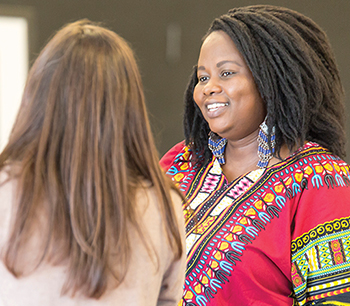 Utah has a population of around 65,000 refugees, according to Department of Workforce Services data, and that number grows by nearly 1,000 each year without accounting for other immigrants. Recognizing the challenges these new Americans face assimilating to their new environment, the U’s College of Social Work recently launched the Center for Research on Migration & Refugee Integration.
Utah has a population of around 65,000 refugees, according to Department of Workforce Services data, and that number grows by nearly 1,000 each year without accounting for other immigrants. Recognizing the challenges these new Americans face assimilating to their new environment, the U’s College of Social Work recently launched the Center for Research on Migration & Refugee Integration.
The center focuses on welcoming and integrating immigrants and refugees into mainstream communities and also serves as a hub for research. It is the first academic center of its kind west of the Mississippi River and is the result of a year-long discussion between the college, university faculty, and community partners including the Office of Refugee Services, International Rescue Committee, and Utah Department of Workforce Services.
Both university and community researchers will network through the center to explore issues related to immigration and refugee integration. Areas of immediate research focus include youth and parenting challenges; development of a certification process for accepting academic and professional degrees granted in other countries; and an assessment of currently available services and research on refugee and immigrant issues.
Iconic Wall Mansion to Serve as Off-Campus Embassy
The historic Wall Mansion in the heart of Salt Lake City has a new name and purpose. The recently refurbished building opened in August and has been renamed the Thomas S. Monson Center after the current president of The Church of Jesus Christ of Latter-day Saints. Monson BS’48 is a distinguished alumnus of the U’s David Eccles School of Business, a past faculty member, and an honorary doctorate recipient.
The mansion is now home to the Kem C. Gardner Policy Institute, which develops and shares economic, demographic, and public policy data to help business and community leaders make more informed decisions. The new center will play a pivotal role in bringing economists, business leaders, and civic authorities together to examine issues pertinent to the state of Utah, and advance policies that will stimulate its growth and development. The mansion also provides a space for community gatherings and private events, encouraging further interaction between the U and the community it serves.
The historic 50,000-square-foot mansion has been restored to its original elegance and function, including restoring the original east entrance to its former state. The mansion was designed by renowned architect Richard K. A. Kletting, who also designed the Utah State Capitol. Enos A. Wall, who remodeled and enlarged the home into a Renaissance villa, purchased the property in 1904 and lived in it until 1920. After serving as the Jewish Community Center and then LDS Business College, the mansion was donated to the U by the LDS church in 2014.
Learn more about Kem Gardner here.
Happy Birthday, Swoop!
 The U’s beloved mascot, a red-tailed hawk named Swoop, turned 20 in 2016. Festivities ensued, including a party at the Campus Store and a halftime celebration during the first home football game. Instead of gifts, Swoop requested donations of school supplies for local children. Lowell Bennion Community Service volunteers responded by helping stuff 400 bags with school necessities that Swoop helped distribute to Lincoln Elementary School students in Salt Lake City.
The U’s beloved mascot, a red-tailed hawk named Swoop, turned 20 in 2016. Festivities ensued, including a party at the Campus Store and a halftime celebration during the first home football game. Instead of gifts, Swoop requested donations of school supplies for local children. Lowell Bennion Community Service volunteers responded by helping stuff 400 bags with school necessities that Swoop helped distribute to Lincoln Elementary School students in Salt Lake City.
After having gone many years without an official mascot, the U introduced the indigenous bird as the new symbol of school spirit in 1996. Since then Swoop has been busy bolstering Ute pride, whether he’s energizing crowds, high-fiving kids, or helping at charity events. Cheers to you, Swoop!
Find out more about the student who named Swoop 20 years ago here.
Web Exclusive Video
Check out a video tribute to Swoop made by U student filmmakers:
